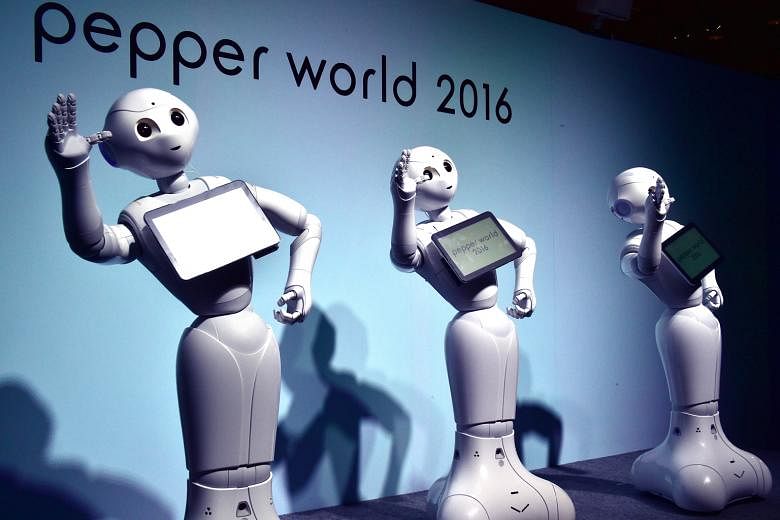WASHINGTON • Drivers, caddies, sex workers - scientists warn that no job category will be safe from takeover by robots as rapid developments in artificial intelligence (AI) threaten a new era of mass unemployment.
Intelligent machines will soon replace human workers in all sectors of the economy, senior computer scientists told the American Association for the Advancement of Science meeting in Washington.
"We are approaching a time when machines will be able to outperform humans at almost any task," said Professor Moshe Vardi, director of the Institute for Information Technology at Rice University in Texas.
-
Artificial intelligence 'threat to human race'
-
WASHINGTON • Some of the world's great minds have warned that artificial intelligence, including masterless drones, threatens the future of the human race.
British astrophysicist Stephen Hawking said in a BBC interview in 2014 the consequences of rapid technical progress could be dire.
"It would take off on its own, and redesign itself at an ever increasing rate," he said. "Humans, who are limited by slow biological evolution, couldn't compete and would be superseded. The development of full artificial intelligence could spell the end of the human race." Tech billionaires Bill Gates and Elon Musk have issued similar warnings.
The question of what happens when machines begin to dominate people's lives has led scientists to call for the establishment of an ethical framework for the development of artificial intelligence, as well as safeguards for security in the years to come.
Last year Mr Musk - the owner of spacecraft manufacturer SpaceX - donated US$10 million (S$14 million) to resolve such concerns, deeming artificial intelligence potentially more dangerous than nuclear weapons.
For Yale University ethicist Wendel Wallach, such dangers require a global response and he called for a presidential order declaring that lethal autonomous weapons systems violated international humanitarian law.
"The basic idea is that there is a need for concerted action to keep technology a good servant and not let it become a dangerous master," he said.
Consultants McKinsey published research last year that said well-paid careers like doctors and hedge fund managers are better protected than others.
AGENCE FRANCE-PRESSE, THE GUARDIAN
"Robots are doing more and more jobs that people used to do. Pharmacists, prison guards, boning chicken, bartending, more and more jobs, we're able to mechanise them."
Prof Vardi said 10 per cent of jobs related to driving in the United States could be lost to driverless cars in the next 25 years. He said it would be hard to think of any jobs that would not be vulnerable to robotics and AI - even sex workers. "Are you going to bet against sex robots?" he asked. "I'm not."
"Society needs to confront this question before it is upon us: If machines are capable of doing almost any work humans can do, what will humans do? Can the global economy adapt to greater than 50 per cent unemployment?" he asked.
Professor Bart Selman, from Cornell University, told the weekend meeting that AI was switching quickly from academic research into the real world.
"Computers are starting to 'hear' and 'see' as humans do... Systems can start to move and operate among us autonomously."
He said business giants such as Google, Facebook, IBM, Microsoft and Tesla were already investing billions of dollars a year in AI systems - investment in the sector in the US was by far the highest ever last year. Also, the Pentagon had requested US$19 billion (S$26.6 billion) for developing intelligent weapons systems.
With more than 200,000 industrial robots in the US now, research is focusing on the reasoning abilities of machines, and progress in this realm over the past 20 years has been spectacular, said Prof Vardi. "And there is every reason to believe the progress in the next 25 years will be equally dramatic."
Last December, Singapore's Nanyang Technological University unveiled a humanoid "receptionist" that NTU said could be a personal assistant in offices and homes in future and a social companion for the young and the elderly.
One of the fastest advancing areas of AI was machine vision - key to the self-driving vehicles - and particularly facial recognition, Prof Selman said. "Facebook can recognise faces better than any of us."
He said that "in the next two or three years, semi-autonomous or autonomous systems will march into our society".
He listed self-driving cars and trucks, autonomous drones for surveillance and fully automatic trading systems, along with house robots and other kinds of "intelligence assistance" which make decisions on behalf of humans.
It is not just the social issue of job losses that AI raises. The fear of artificial intelligence has even reached the United Nations, where a group billing itself the Campaign to Stop Killer Robots met diplomats in October last year to warn against a growing reliance on cheap drones and "stupid AI" that can be unpredictable in the real world.
AGENCE FRANCE-PRESSE, THE GUARDIAN

